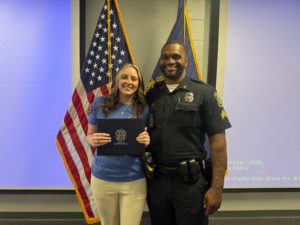Shannon Brewer was hesitant to become a foster parent, even though she wanted to build a family with her husband of 16 years. “I looked into adoption and for some reason we were really, really nervous about foster care. I thought I would hate to get too attached and then, if the child went back, get discouraged.”
A friend encouraged her to take some training classes and see if fostering felt right. After a few weeks, Shannon and her husband decided to become certified foster parents. A month later they opened their home to a young boy, who they later adopted.
“It doesn’t hurt to have the training and then if something comes up and you can’t offer a child the stability they need, you can decline placement–but it’s nice to be certified if your heart tells you that you should be.” Shannon said.
Being a new foster parent comes with many responsibilities, and Shannon said having a mentor to talk with for the first six months was incredibly helpful. She credits the experience with her decision to eventually become a mentor herself in the UK College of Social Work Foster Parent Mentor Program.
Access to Resources and Support
The Foster Parent Mentor Program is designed to be a sounding board and resource for foster parents, to help ease the frustrations and challenges that can come with providing out-of-home care for abused, neglected, and dependent children. The program specializes in one-on-one short term, intensive coaching relationships, which provide foster parents emotional encouragement and parenting strategies to help build a stable environment for the children in their care.
Arsenio B. joined the program after becoming a foster parent to a young boy who was just a few days old. He says the relationship with his mentor, Wanda Holt, has provided both emotional support and concrete guidance for how to navigate the sometimes complex system of foster care.
“If I felt like I wasn’t being heard or was being overlooked, she was able to calm me down and level me out and say these are the connections, here’s what we need to go through (to get things handled),” Arsenio said.
Having been a foster parent herself, mentor Wanda Holt understands many of the frustrations her fellow foster parents experience and is glad to help them navigate the new territory. “When I meet foster parents for the first time, I let them know I’m not a social worker. I’m not going to come to your home unless you invite me. I’m checking on you as a support system. I’m here for when you need someone to talk to. When you need an outlet to be able to, you know, just kind of let out your frustrations,” Holt said. “I have been a foster parent and sometimes it feels like you’re the only person who’s going through it, but because of my experience, I’m able to let them know you’re not the only person who’s been through it, and we all made it, you know, so I’m able to kind of pull them through a lot of the situations.”
Every mentor relationship is different, as every foster parent has a unique situation. The one-on-one nature of the Foster Parent Mentor Program means that participants can work with their mentor to figure out what works best for them. That may be connecting by phone, email, or text several times a month, or sharing resources on navigating the child welfare system. Above all, a mentor is there to listen, guide, and encourage new foster parents.
Arsenio points to the opportunity to extend the mentorship program with Wanda when a difficult legal situation arose as incredibly helpful for steadying the ship. “I had to go to court and I said please, I still need her. I was able to extend our mentorship time because I knew I needed her in my corner now more than ever. The baby has me and the case worker, etc. My mentor is my personal person, you know? So that’s been a blessing.”
Building Relationships for a Lifetime
It’s also an opportunity to build tremendous community relationships and connections that can become like a second family. Shannon has mentored many new foster parents in the years since she became one herself, and said that even when there are difficult moments, there are also tremendous opportunities for joy.
Recently, one of the foster parents she coached for six months had the opportunity to adopt the child who was placed with that foster family, and the mentee invited Shannon to attend the ceremony. “During COVID was her adoption of this little one that she had as a placement, and she invited me and my husband and my son to watch via Zoom, along with her church family. She phoned me crying and thanked me for helping her through some of the hardest times of her life.” Shannon said. “Supporting foster parents helps provide a more nurturing environment for the children because they are more apt to be able to give that child what they need at that time, and then hopefully continue to help other children. And that’s why the mentor program is so near and dear to my heart.”






